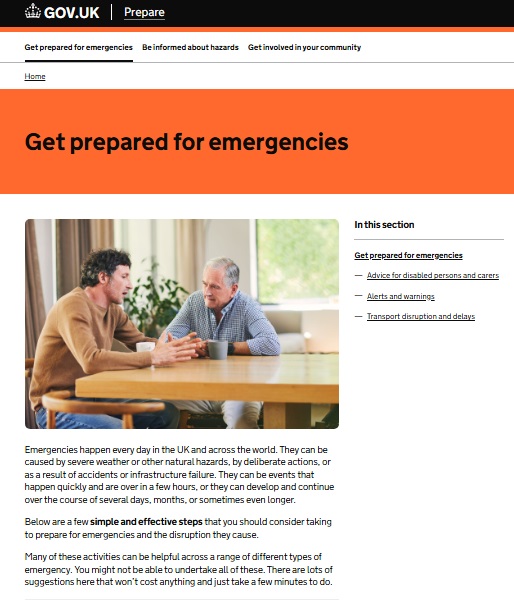 On April 2, 2025, Britain joined other European countries in issuing guidance to the public to prepare for emergencies. According to press accounts, flooding was the most common risk, but other emergencies could be pandemic, cyberattacks that cut off the internet, or a nuclear war in Europe.
On April 2, 2025, Britain joined other European countries in issuing guidance to the public to prepare for emergencies. According to press accounts, flooding was the most common risk, but other emergencies could be pandemic, cyberattacks that cut off the internet, or a nuclear war in Europe.
And Germany, in addition to encouraging citizens to stock up on needed goods, is calling for schools to provide civil defense training to prepare students for war scenarios.
The UK list of recommended supplies includes the following items: (The links are to previous posts on this site discussing them in more detail, or to inexpensive items available at Amazon.)
- Battery or wind-up Flashlight
- Portable power bank for charging your mobile phone
- Battery or wind-up radio. (The site reminds Britons that a car radio could be used, but in the case of severe weather, it might not be safe to go to the car.)
- Spare batteries for flashlights, radio, and any medical equipment
- first aid kit
- Hand sanitizer and wet wipes
- Bottled water
- Non-perishable food that doesn’t need cooking
- Pet food
- Baby supplies such as diapers and formula
Most of our readers are ahead of the curve, and are prepared in excess of these bare minimums. But even so, it doesn’t hurt to look through a list like this, and make sure you have these items available at home, at work, in your car, at school, or wherever you might find yourself when disaster strikes. And, of course, not all of your neighbors are prepared, and it might be helpful to nudge them in the right direction by pointing out that mainstream media in countries throughout Europe are now encouraging basic preparations. You can click here for all of our posts on the subject of emergency preparedness.
We hope there won’t be a war. But it doesn’t hurt to take at least some minimal preparations to help you should there be one, or even a more mundane emergency.
Some links on this site are affiliate links, meaning that this site earns a small commission if you make a purchase after using the link.
